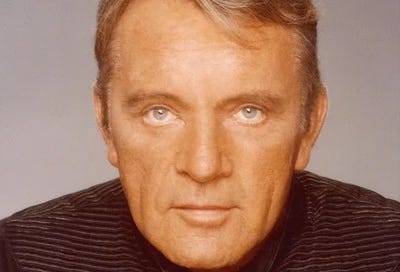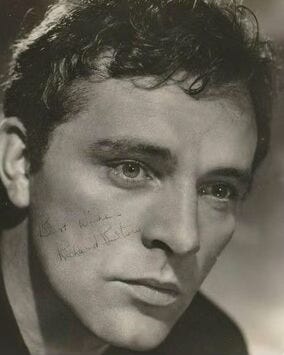Adorable Story #118: The Many Lives of Richard Burton - Part 1
Shakespeare, Stardom, and Struggles
Rising from humble beginnings in Wales, Richard Burton began his acting career with Shakespearean roles on the London stage, quickly earning acclaim for his extraordinary intensity and talent.
His magnetic presence and commanding voice propelled him to become one of Hollywood’s highest-paid actors, renowned for his exceptional performances as well as for his flair for drama, both on and off the stage.
Table of Contents of Part 1: Early Life and Education / Meeting His Mentor / World War II / Career Beginnings / Transition From Theatre to Hollywood / Hamlet at The Old Vic
If you aren’t subscribed yet, hit the subscribe button below to receive the Adorable Stories every weekend, directly in your inbox:
Early Life and Education
Richard Burton was born Richard Walter Jenkins Jr. on November 10th, 1925, in Pontrhydyfen, a small village in Wales.
Richard was the twelfth of thirteen children in a working-class family: his father, Richard Jenkins Sr., was a coal miner, while his mother, Edith Maude, took care of house but sadly passed away when he was just two years old due to post-partum complications.
Richard was subsequently raised by his sister Cecilia and her husband.
Despite these challenges, Richard displayed an early aptitude for academics and athletics, and his life took a pivotal turn at 14 when, as the first member of his family, he enrolled to Secondary School and met Philip Burton, a teacher who became a father figure to him.
Meeting His Mentor
“His voice was tough to begin with but with constant practice it became memorably beautiful.”
— Philip Burton
In 1939, Richard attended Port Talbot Secondary School in Port Talbot, Wales.
Philip Burton was a teacher there and took a special interest in Richard, recognizing his potential as an actor.
Philip not only taught Richard in the classroom but also provided extensive after-school coaching, particularly in elocution, voice projection, and classical literature.
He helped Richard overcome his thick Welsh accent and trained him to develop the deep, resonant voice that would later become one of his trademarks.
Additionally, Philip introduced Richard to Shakespeare and classical works, laying the groundwork for his career in theatre.
Their relationship went beyond the traditional teacher-student dynamic, as Philip slowly became a father figure in Richard’s life after his mother’s death and his father’s complete emotional absence.
Philip called Richard “my son to all intents and purposes. I was committed to him”, while Burton later wrote of Philip: “I owe him everything”.
Their relationship developed to the point when in 1943, Philip Burton legally adopted Richard, though it wasn’t a formal adoption in the modern sense. Instead, Philip became Richard’s legal guardian when Richard was 17 years old (Philip was indeed 20 days too young to be 21 years older than his adoptee, a legal requirement for adoption at the time).
This arrangement allowed Richard to leave his sister’s house and live with Philip and his wife, providing him with a stable home environment and the opportunity to pursue acting more seriously.
Philip took on this role after recognizing Richard’s immense talent and determination.
He guided Richard not only in acting but also in his education, helping him secure a scholarship to attend Exeter College, Oxford, for a six-month program designed for war veterans.
It was during this time, when Richard became 18, that he adopted the surname “Burton” in honor of Philip.
World War II
During World War II, Richard Burton served in the Royal Air Force (RAF). In 1944, at the age of 18, he enlisted in the RAF originally to train as a pilot and then, due to poor eye-sight, as a navigator trainee, hoping to contribute to the war effort. His poor eye-sight prevented him from serving in active duty, and he was eventually discharged in 1947.
Despite his brief time in the RAF, his experiences during the war years shaped his discipline and worldview, and he returned to civilian life determined to pursue a professional acting career, which he had already begun exploring under the guidance of his mentor, Philip Burton.
Career Beginnings
Richard Burton began his professional acting career in 1943 when he made his stage debut in a play called The Druid’s Rest at the Repertory Theatre in Liverpool, directed by his mentor, Philip Burton.
This opportunity came after years of training in elocution and Shakespearean performance under Philip’s guidance.
Following his stage debut, Burton’s charisma and powerful voice quickly earned him recognition, and he soon appeared in repertory productions in London’s West End, where he gained acclaim for his commanding presence.
It was in this period that Richard was introduced to alcohol, a habit which was strongly disapproved by his mentor: Philip Burton tried to curb Richard’s alcohol consumption, warning him about its dangers and how it could derail his promising career. Despite these repeated warnings, Richard found himself drawn to the camaraderie and confidence that alcohol seemed to provide, and it soon became a regular part of his life.
Richard continued to refine his acting technique during a brief stint at Exeter College, Oxford, in 1944, studying under Shakespearean expert Sir Neville Coghill. At Exeter, Richard Burton appeared in the production of William Shakespeare’s Measure for Measure.
On his performance, fellow actor and friend, Robert Hardy recalled:
“There were moments when he totally commanded the audience by this stillness. And the voice which would sing like a violin and with a bass that could shake the floor.”
By the late 1940s, Burton was called by Emlyn Williams for a screen test for his film The Last Days of Dolwyn (1949).
Burton performed the screen test for the role of Gareth, which Williams wrote especially for him, and was subsequently selected when Williams sent him a telegram that quoted a line from The Corn Is Green:
“You have won the scholarship.”
This led to Burton making his mainstream film debut, which showcased his ability to bring intensity and depth to his characters.
Film critic Philip French of The Guardian called it an “impressive movie debut.”
His career gained momentum with stage appearances in London and New York, for The Lady’s Not For Burning, a play by Christopher Fry and directed by John Gielgud (who also played the lead role).
Richard Burton received the Theatre World Award for this performance, his first major award.
A defining moment came in 1951 when he played Prince Hal in Shakespeare’s Henry IV, Part 1 at Stratford-upon-Avon, earning critical acclaim and solidifying his status as a prominent British actor.
Theatre critic Kenneth Tynan said of his performance:
“His playing of Prince Hal turned interested speculation to awe almost as soon as he started to speak; in the first intermission local critics stood agape in the lobbies.”
Richard was also praised by Humphrey Bogart (featured in the Adorable Story #94) and his wife Lauren Bacall after both saw the play.
Bacall later said of him:
“He was just marvellous [...] Bogie loved him. We all did.”
Transition From Theatre to Hollywood
Richard Burton’s transition to Hollywood after 1951 was marked by his growing reputation as a versatile and magnetic actor on both stage and screen.
His critically acclaimed performance as Prince Hal in Henry IV, Part 1 caught the attention of international producers, including Darryl F. Zanuck, co-founder of 20th Century Fox (extensively featured in the Adorable Story #66), who signed Richard for three films and negotiated for him a total salary of USD 150,000 (USD 50,000 per film).
This contract led to his first major Hollywood role in My Cousin Rachel, opposite Olivia de Havilland.
Based on the 1951 novel of the same name by Daphne du Maurier, My Cousin Rachel is about a man who suspects his rich cousin was murdered by his wife in order to inherit his wealth, but ends up falling in love with her, despite his suspicions.
Upon release, the film was successful at the box office, and Burton’s performance received mostly excellent reviews.
The film earned Burton the Golden Globe Award for New Star of the Year – Actor and his first Academy Award nomination in the Best Supporting Actor category.
Following this success, Burton appeared in Biblical epic drama The Robe (1953) (notably replacing Tyrone Power — featured in the Adorable Story #33 — who was originally cast in the role of Marcellus Gallio) which became a massive box-office hit and solidified his status as a leading man in Hollywood.
After The Robe’s success, Zanuck offered Richard Burton a seven-year, seven-picture USD 1 million contract (equivalent to approximately USD 12 million in 2025).
Gossip columnist Hedda Hopper (extensively featured in the Adorable Story #117) considered Burton’s success in Hollywood to be:
“the most exciting success story since Gregory Peck’s contracts of ten years back”.
By the mid-1950s, Burton was balancing Hollywood films with stage performances, earning a reputation as an actor who could bridge the gap between classical theater and mainstream cinema.
His ability to perform in both mediums with equal skill made him one of the most sought-after actors of his generation, and he continued to take on major roles in epic productions throughout the decade.
Hamlet at The Old Vic
“I never knew a man who played Hamlet who didn’t die broke.”
— Humphrey Bogart
In 1953, Richard Burton decided to postpone working for Darryl Zanuck for a year and made the bold decision to play Hamlet at the Old Vic Theatre in London instead: a role that many considered the ultimate test of an actor’s skill and depth.
At just 28 years old, Burton approached the part with intense dedication, studying the text meticulously and working closely with director Michael Benthall to craft a performance that was both dynamic and introspective.
Richard rehearsed extensively with his mentor Philip Burton in order to explore the nuances of the character, perfect his delivery of Shakespearean verse, and develop the emotional depth required for the role.
He drew on his own experiences of loss and inner turmoil to bring a raw emotional intensity to the role.
Burton’s interpretation emphasized Hamlet’s fiery passion and inner conflict, departing from more traditional, “frozen” portrayals.
Philip’s influence was instrumental in shaping Richard’s approach to the part, by encouraging Richard to dig deeper into Hamlet’s psychological complexity and to bring a modern, relatable humanity to the role: this rigorous preparation with Philip, combined with Richard’s own natural intensity and talent, helped create a performance that was both powerful and groundbreaking.
The production was a resounding success, earning widespread acclaim from critics and audiences alike.
Many, including Winston Churchill, praised Burton’s commanding stage presence, his magnetic voice, and his ability to convey both the intellectual complexity and emotional vulnerability of the Danish prince.
The role cemented Burton’s reputation as one of the finest stage actors of his generation and marked a turning point in his career, demonstrating his ability to tackle Shakespeare’s most challenging roles with brilliance and originality.
(End of Part 1 — Subscribe today to get Part 2 in your inbox next weekend!)
—Alberto @
Do you know anyone who would love to read this Adorable Story? Show your support by sharing Adorable Times’ Newsletter and earn rewards for your referrals.










